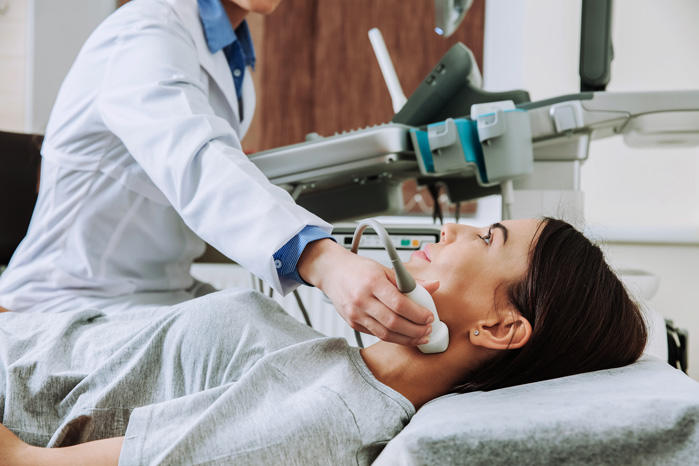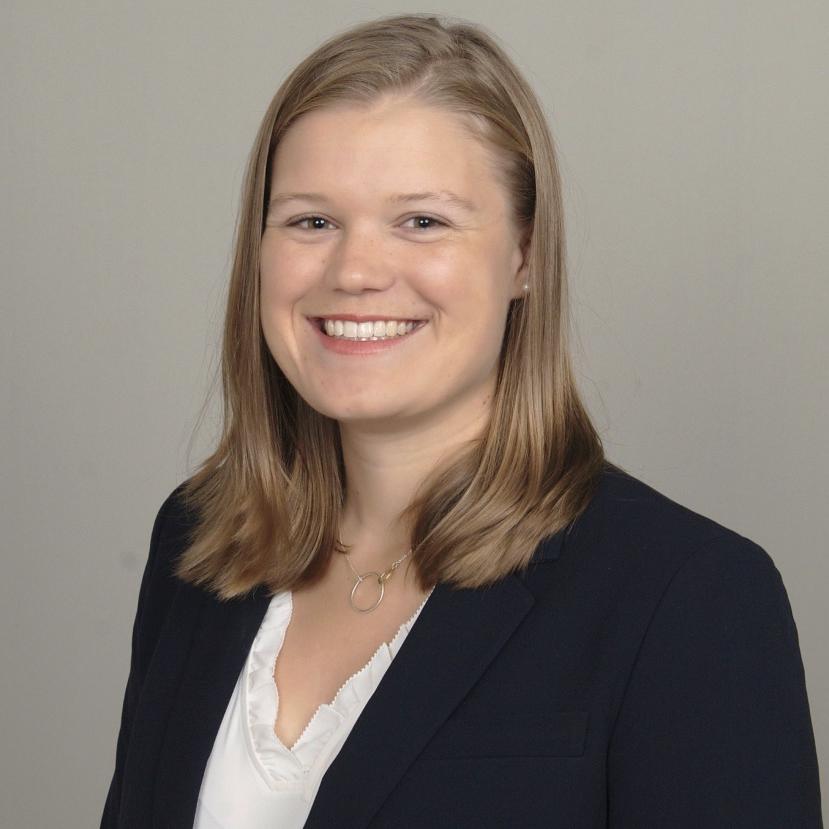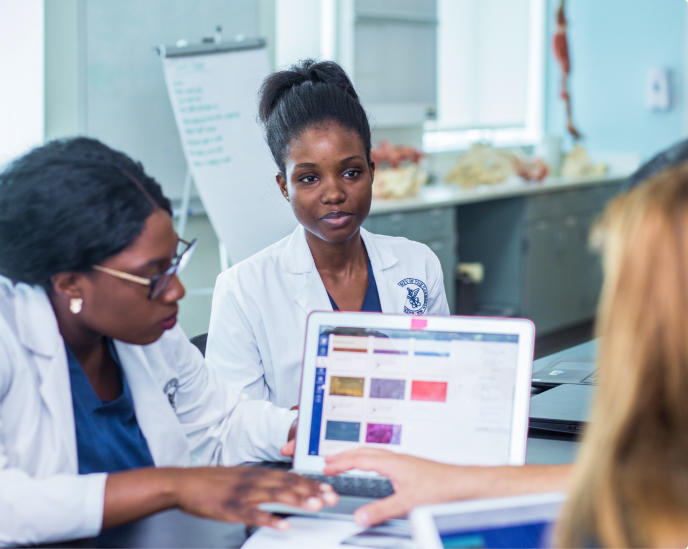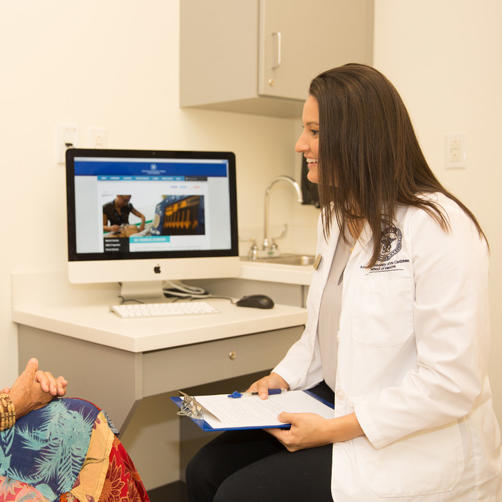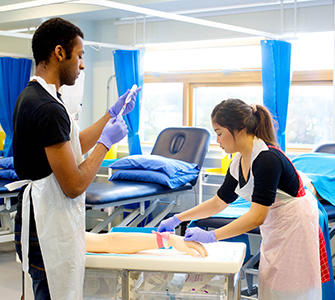If you’re interested in becoming a physician who focuses on treating a wide range of internal diseases and conditions in adults, you might want to consider a career in internal medicine. You might be curious to know exactly what is internal medicine. Or why choose internal medicine over other medical specialties? As a doctor of internal medicine, you’ll serve as the first point of care for your patients. It’s a specialty that often attracts doctors interested in a broad range of care and in building relationships with patients they treat over the course of their adulthoods.
If you’re considering internal medicine, ask yourself these questions:
- Do you enjoy talking to patients and forming a relationship with them?
- Do you want to work in both a hospital and an office setting?
- Do you seek variety in your work—treating an ear infection in one patient while puzzling through a complex coronary issue with your next patient?
- Do you want a career in one of the most in-demand fields of medicine?
- Do you want to focus on treating adult patients rather than children?
If your answer to these questions is “yes,” then internal medicine might be the right specialty for you.
WHAT IS INTERNAL MEDICINE? WHAT DOES AN INTERNIST DO?
The term internal medicine is derived from the German phase innere medizin, which loosely translates into the science of combining laboratory research with patient care. German doctors brought this term to the United States in the early 1900s, and American physicians adopted it as “internal medicine.” Many people mistakenly think that internal medicine physicians only treat internal systems when they actually treat the whole body.
Internal medicine physicians are also known as “internists.” You may wonder, what is an internist? What do internal medicine doctors treat? An internist specializes in managing diseases of such internal organs such as the heart, lungs, kidneys, and liver. Internists serve as primary care physicians for patients aged 18 and older. As primary care doctors, they focus on disease prevention, substance abuse, mental health, and treatment of common problems of the eyes, ears, skin, nervous system, and reproductive organs, according to the American Medical Association.
Internal medicine gives physicians the opportunity to combine clinical diagnostics on a wide range of complex and common conditions with a personalized and compassionate approach to medicine. Internists also diagnose and treat such chronic adult conditions as diabetes, heart disease, and lung maladies. Internists are usually the first doctor a patient sees, and if necessary, they will refer patients to a specialist physician.
HOW TO BECOME AN INTERNIST
To be an internist, you must first become a physician by graduating from an accredited medical school—such as American University of the Caribbean School of Medicine* (AUC). The path to a medical degree at AUC, which is located on the Caribbean island of St. Maarten, is the same as at United States-based schools: two years of medical science classes and two years of hands-on clinical training. For AUC students, the medical sciences curriculum is completed at the St. Maarten campus; the clinical training can be completed at affiliated teaching hospitals in the United States or in the United Kingdom.
AUC also partners with the University of Central Lancashire (UCLan) in the United Kingdom for a “UK-track” option. The first two years at UCLan focus on studying the medical sciences. Upon completion, students receive a Post Graduate Diploma in International Medical Sciences, which AUC recognizes as equivalent to its own medical sciences curriculum. During the final two years, students can then complete clinical training across AUC’s network of affiliated teaching hospitals.
During clinical training, AUC students complete core rotations in internal medicine, surgery, pediatrics, family medicine, obstetrics/ gynecology, and psychiatry. Each individual student, then, selects from among dozens of specialty elective clerkships to fulfill their remaining clinical requirements.
During the fourth and final year of medical school, students prepare for the next phase of their medical education: residency. At AUC, the Office of Career Advisement (OCA) can help students determine which residency specialty—such as internal medicine—suits them best. The OCA then helps students navigate the National Resident Matching Program® (NRMP®)—a placement system which medical students who wish to become licensed in the United States use to “match” with a medical residency. Residencies are required to become a licensed physician, and they last from three to eight years. A residency in internal medicine is typically three years, but the American College of Physicians reports that fewer than half of all internists stop there to practice general internal medicine and serve as primary care physicians. The rest use internal medicine as a preliminary residency before moving on to such subspecialties as:
- Cardiology
- Endocrinology
- Gastroenterology
- Hematology
- Hospital medicine
- Infectious diseases
- Nephrology
- Oncology
- Pulmonary care
- Rheumatology
An internal medicine resident may simultaneously train in another specialty, which allows them to be “double-boarded” by both the American Board of Internal Medicine and the certification board of their other medical specialty. Common specialty residencies combined with internal medicine include:
- Anesthesiology
- Dermatology
- Emergency medicine
- Family medicine
- Medical genetics
- Neurology
- Pediatrics
- Preventive medicine
- Psychiatry
In 2022, AUC had a first-time residency attainment rate of 96 percent for 2021-2022 graduates. In recent years, AUC MD’s have matched with hundreds of internal medicine residencies at hospitals across the United States. These hospitals include College Medical Center in California; Garnet Health Medical Center in New York; LewisGale Medical Center in Virginia; University Health Truman Medical Center in Missouri.
MEET AN INTERNIST-PEDIATRICIAN
Rebecca Gerrity, MD, a 2019 AUC graduate, is a resident physician in internal-pediatric medicine at The University of Tennessee Health Science Center (UTHSC) in Memphis. We asked Dr. Gerrity to describe the role of a "MedPeds" physician.
Q: Why did you go into your specialty?
A: Internal Medicine and Pediatrics is a residency training program and career path that allows physicians ample inpatient and outpatient medicine and pediatrics exposure, opens the doors to fellowships in all medicine and pediatrics subspecialties, and allows for a deep understanding of how childhood illnesses and experiences can impact adult diseases. What could be better?! In addition to all the amazingness that MedPeds offers, I had a few experiences in medical school which made me realize that my passion in medicine lay in helping individuals in low-middle-income countries/ counties in the United States. Internal medicine and pediatrics was absolutely the right choice for me as it allows me comprehensive training in a wide spectrum of disease states/ presentations across all ages.
Q: Any advice to medical students considering the specialty?
A: Use all your resources and reach out to alumni. I was so lucky to have an early introduction to Dr. Desai who visited SXM [the code for St. Maarten airport, and a common way to refer to St. Maarten itself] early in my second year of medical school. Dr. Desai completed a residency in MedPeds and introduced me to the idea and I am forever grateful to him! I also was able to speak with numerous AUC MedPeds alumni via email and this led me to further understand the vast opportunities allotted to MedPeds physicians. The resources that AUC has to offer through OCA [AUC's Office of Career Advisement] are incredible—I cannot emphasize how awesome they are at helping you set yourself up for success.
Q: What is the most rewarding part of your job?
A: The patients and the physicians I work with make my job the best job in the world! I relish the humbling opportunity to treat patients and communicate with their families. Developing relationships with patients, understanding what makes them happy, who they love, and what their hopes are for when they are better is what makes this job rewarding. I cannot help but mention the incredible colleagues and faculty that I work with every day. My co-residents make the job infinitely easier and offer so much support and empathy when the hard days roll through. The faculty at UTHSC are incredible—they are interested in each resident's passion and are eager to help us succeed in whatever career we have in mind after residency. Finding “your people” and banding together to serve patients is what makes this job so rewarding and I hope that every person can find a community as wonderful as mine to support them through their residency!
DEMAND FOR INTERNAL MEDICINE
A 2020 report by the Association of American Medical Colleges (AAMC) showed that the United States will see a shortage of nearly 122,000 physicians by 2032 as demand for doctors grows faster than supply. The report projects a shortage of up to 55,200 primary care doctors. A 2019 Doximity report ranks internists second only to family medicine doctors as the most in-demand specialty in the coming decade.
Now that you have an answer to what is internal medicine, read more about how to become an internist, get the full scoop on internal medicine as a career, and check out the AUC MD program. Start on your path to internal medicine: apply for admission in AUC.
Related Resources:


